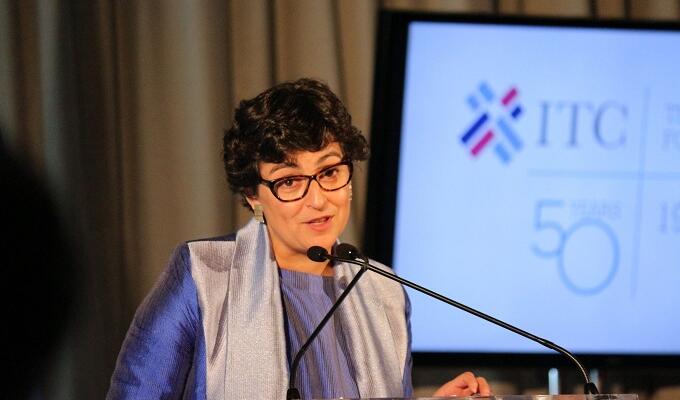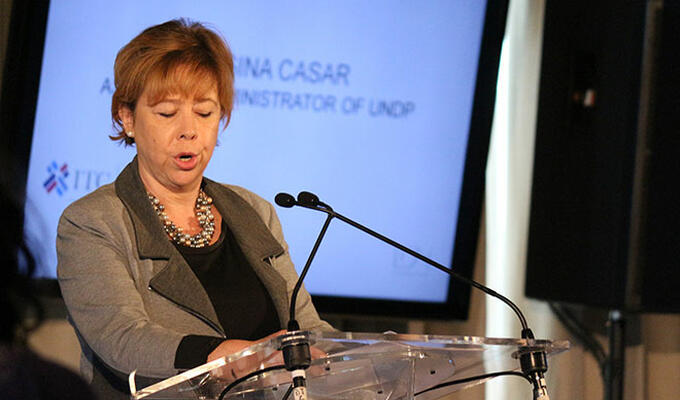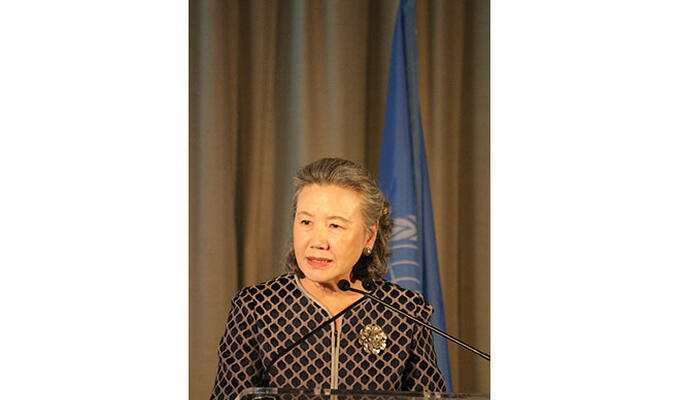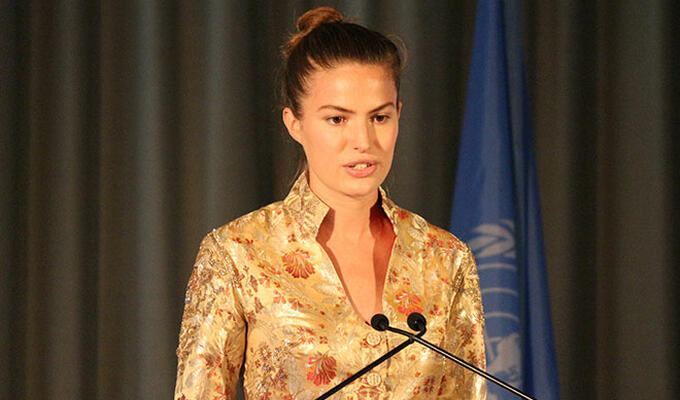



Remarks by the Executive Director at the LDNY Foundation & ITC Luncheon and Fashion Show
Delivered on 22 September 2014 at the LDNY Foundation & ITC Luncheon and Fashion show.
(CHECK AGAINST DELIVERY)
Ladies and Gentlemen,
On behalf of my co-chairs and myself, I welcome you to this London-New York Foundation (LDNY) and ITC supported fashion show which takes place at a critical moment- at the beginning of the United Nations General Assembly where an array of issues- including development and gender - will be discussed.
We are gathered here because we believe in the importance of women's economic empowerment for the progress of our societies.
Today we will showcase how supporting innovation and opportunities in the fashion industry can create a space for women to be active members of our economies. By providing a platform for artisans and designers from developing countries to meet and interact with some of the biggest names and buyers in the fashion industry we are helping to build relationships- economic relationships- which can support these artisans to expand the reach of their products, their designs and more importantly, their stories.
Many people underestimate the economic impact of the fashion sector. It's potential to create jobs along the value chain, add value to raw materials, develop ingenuity and bridge geographical boundaries are limitless. However, like in so many other sectors, even though the ideas and the capacity exist amongst the talented entrepreneurs in developing countries there is a need to bring them closer to the market. It is about building their skills and knowledge to understand the industry, exploit the opportunities, expand their consumer base, and generate more jobs and revenue in their home country.
This is where the United Nations – through the International Trade Centre – plays a role. At the ITC we promote trade impact for good. We link micro, small and medium producers to markets; buyers to sellers; we support small businesses competitiveness; we build the capacity of local trade institutions to act as multipliers and ensure value addition is retained in-country. We help transform business ideas into realities. Business is dynamic and multi-dimensional and so is ITC's way of working.
It is not charity. It is just work.
This is why today is about twelve extraordinary women artisans. They come from each continent of this world: from Ethiopia, India, Mongolia, Palestine, Papua New Guinea and Peru. They are young, dynamic, determined. They are the visible faces of hundreds of others working in their production chains.
They are a small - but beautiful - part of the ITC's Women and Trade Programme which spans women in coffee, in Shea butter, in fruits and vegetables, in tourism, construction and other services, and in textiles and clothing
Ladies and Gentlemen,
When executed responsibly - respecting fair labour, sustainability and artisanal traditions, the fashion business can change the lives of families and communities. We know that it improves education of children, of nutrition, of healthcare, of housing, but most importantly decent jobs give women dignity. This is why we like to talk about "ethical fashion".
But this impact for good can only be achieved through long term partnerships.
One crucial partnership is the one we have with local trade support institutions like PromPeru, Ethiopia or the Palestine's Business Women Forum; as well as the one we have with academia like New York's Parsons the New School for Design and the London College of Fashion. The boost in competitiveness to local producers is a long-term endeavour. Market standards are constantly evolving and so must the training and advisory support which these types of institutions jointly provide.
Parsons, the London college of Fashion and the six institutions (PromPeru, Pacific Islands Trade and Invest, WE Connect International, Mongolian Wool and Cashmere Association, Center for Accelerated Women's Economic Empowerment, and the Business Women Forum) supporting today's event are not the only ones with a crucial role to play in this long-term relationship.
All of us in this room have a part to play in achieving this impact for good.
In the business partnership there must also be responsible and loyal buyers who understand and appreciate the value and purpose behind their spend. As with any successful business venture, it starts with consumers like you and I, owners of boutique shops, and procurement teams from the large department stores and online shopping companies who are committed to support women-owned businesses from developing countries. It is our joint purchasing power that first creates the business opportunities for aspiring women-owned businesses.
I do hope that the show that these twelve artisans will offer us shortly will entice many of you to become their future long-term investors, buyers and advocates. Their long term partners!
I've just mentioned two other critical roles in this business partnership – long-term investors and advocates. Indeed, there must also be business investors who are ready and willing to invest in quality businesses in new or unknown markets. And, who after events like this take the time to investigate the feasibility of engaging long-term in businesses that you will see here later today.
Similarly, celebrities and the media can also play a hugely important role as advocates. I hope that all of us here today will be Ambassadors for this initiative.
In this long-term business partnership there is also a role for donors. And here I want to recognize the support that bilateral development partners such as the UK, Australia and Norway have provided to the ITC Women and Trade programme, in addition to the support from Sweden, Ireland and Germany to the ITCs work on gender. With any business model, market failures can exist – be it lack of understanding of the market either from buyer or seller perspective and/or circumstances limiting seller competitiveness or ability to produce value-added products; and it is donor support to technical organizations like the ITC that helps to address these market failures. It is this support that will allow us to help SMEs internationalise and increase their competitiveness.
Ladies and gentlemen, women's economic empowerment is central to achieving the world we all want – one where all women truly benefit from economic opportunities.
Just last week in Kigali at ITC's World Export Development Forum we launched an initiative to "Empowering Women through Public Procurement" – the aim of which is to increase the share of women-owned small and medium businesses benefiting from public procurement contracts.
There was widespread support for this initiative including from UN Women and the ONE UN. I urge you to take this initiative to your policy makers. It is yet another avenue to raising the economic participation of women in the global economy.
Today's event is about engaging long term responsible relationships through our different roles to ensure women economic empowerment – I encourage you to be inspired by what you see and I challenge you to engage in making it come true.
Thank you



